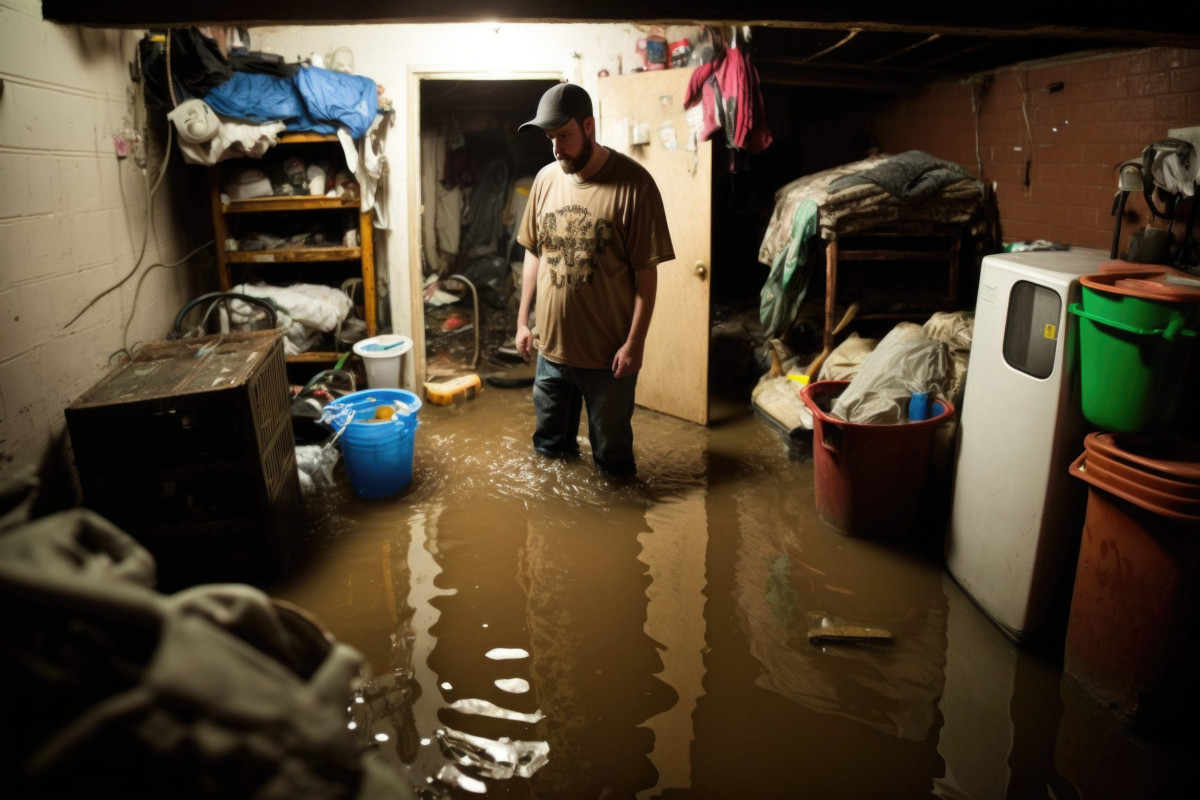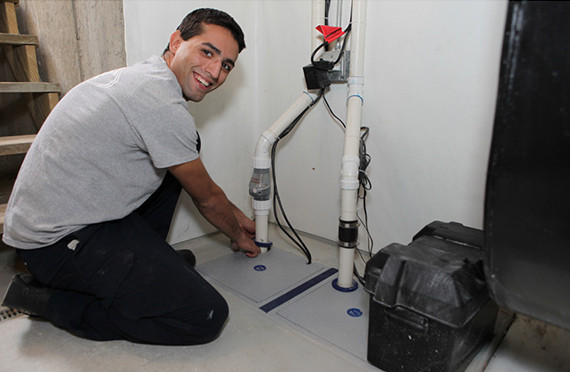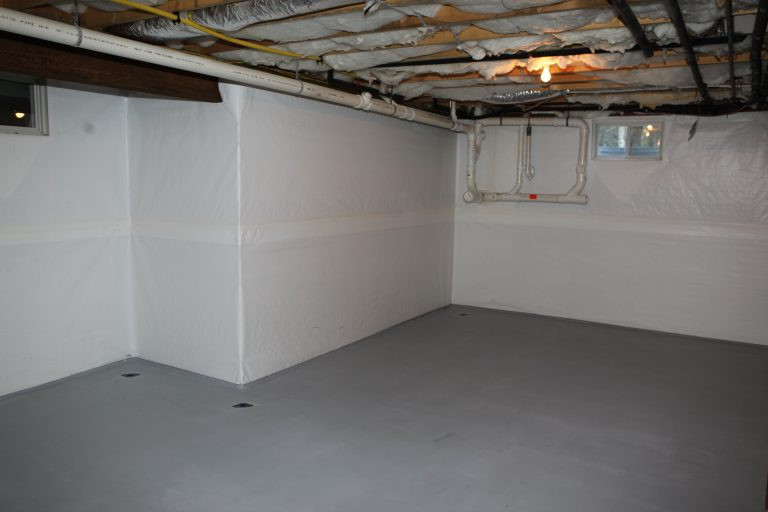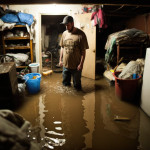Just as the Titanic was ill-prepared to face an iceberg, your do-it-yourself approach to waterproofing your basement might meet a similar fate. You’ve probably tackled a few minor leaks with a can of waterproof paint and a weekend of labor, thinking you’ve checked that box. But, in the long run, these quick fixes often prove ineffective, leaving you to wonder where it all went wrong. Professionals, on the other hand, have a different approach that guarantees a leak-proof basement. Are you ready to explore what sets them apart and how they save you from a potential disaster?
Key Takeaways
- DIY basement waterproofing often fails due to neglecting exterior issues and underestimating the importance of surface preparation.
- Homeowners tend to rely on temporary fixes like waterproof paint or plastic sheeting, which do not provide long-term solutions.
- Professionals use specialized tools and advanced sealants to address root causes of basement moisture, ensuring long-term waterproofing.
- Expert inspections by professionals can identify hidden issues like foundation cracks and mold, preventing costly repairs in the future.
- Professional waterproofing provides lasting protection against dampness, reducing health risks and enhancing the structural integrity of basements.
Common DIY Waterproofing Mistakes
Misguided enthusiasm often leads homeowners to make common mistakes when attempting DIY basement waterproofing. You may be keen to save on the costs of professional services, but keep in mind that incorrect waterproofing can lead to bigger issues down the line.
One major blunder you’re likely to make isn’t considering the source of the water problem. You might focus on internal solutions, such as applying waterproof paint, but neglect to address exterior issues, like poor drainage or cracks in your foundation. It’s crucial to fix these problems first. If you don’t, the water will just find another way in.
You also might underestimate the significance of preparation. Proper preparation involves cleaning the walls and floors thoroughly, filling in cracks, and waiting for the area to dry completely before applying any waterproofing product. Skipping these steps can result in ineffective waterproofing.
Lastly, over-reliance on waterproofing paint is another common mistake. While it can help, it’s not a permanent solution. It can peel or crack over time, leading to water seeping in again.
Inadequate Sealing Techniques
Too many times, DIY enthusiasts resort to quick fixes when it comes to basement waterproofing, particularly in their sealing techniques. You might be tempted to just slap on a layer of waterproof paint or put up some plastic sheeting, but this rarely provides a long-term solution.
In many instances, these inadequate sealing techniques create a false sense of security. Sure, they might stop water from coming in for a while, but they don’t address the root cause of the problem. Over time, water pressure can cause these seals to fail, leading to even more damage than you started with.
Proper sealing requires a thorough understanding of the materials involved and the right tools for the job. Professionals don’t just cover up the problem; they work to create a long-lasting solution that resists water penetration.
This often involves applying a waterproof membrane, installing a drainage system, and using high-quality sealants designed to withstand the specific conditions of your basement.
When it comes to sealing your basement, don’t just go for the quick fix. Do it right, or you might end up dealing with more extensive repairs down the line.
Missed Causes of Basement Leaks
While doing a good job with sealing techniques is essential, it’s just as important to understand what’s causing your basement to leak in the first place.
Often, DIYers overlook some common culprits that professionals identify right away, leading to persistent leakage even after waterproofing attempts.
One often missed cause is poor landscaping. If your yard slopes toward your house, it’s channeling water directly to your basement. A professional would spot this issue and recommend effective solutions, like grading the yard away from the house.
Another overlooked cause is clogged gutters. When gutters are full of leaves or debris, they can’t direct water away from your home effectively. This water can end up seeping into your basement, causing leaks that no amount of sealing can fix.
Lastly, cracks in your home’s foundation can be another source of leaks. These cracks can be tricky to spot and even trickier to correctly seal without professional guidance.
Missing these causes can lead to wasted time, money, and effort, and often leaves you with a still-leaky basement. Understanding these causes is the first step towards effective waterproofing.
The Importance of Professional Inspection
In light of these common oversights, engaging a professional inspector becomes essential. You may believe you’ve done a thorough job, but it’s easy to miss subtleties that a trained eye wouldn’t.
Professionals have years of experience and in-depth knowledge that allows them to spot potential problems you might overlook. They’re not just looking for obvious signs of leaks.
They’re also checking for more hidden issues—like mold, mildew, and structural damage—that could compromise your basement’s integrity. This can save you from costly repairs down the line.
Even if you’re confident in your DIY skills, it’s worth having a pro give your basement a once-over after you’ve done your best. They can confirm your work is up to par, or point out areas you need to address.
It’s not just about preventing leaks—it’s about ensuring your basement is safe and sound for years to come. Ultimately, a professional inspector is an investment in your home’s longevity and your peace of mind.
Don’t underestimate the importance of this step in your basement waterproofing process.
Tools and Techniques Pros Use
Peering into a professional’s toolkit might leave you amazed at the range and specificity of equipment they use for basement waterproofing. From high-powered sump pumps to industrial-grade sealants, every tool has a specific purpose.
They’re not just using a regular shovel, but a trenching shovel designed for digging narrow trenches. They don’t just apply any sealant, but one that’s specially formulated to withstand the pressure of underground water.
Professionals also use advanced techniques like interior water drainage systems, which DIY attempts often overlook. You might see them installing a perforated pipe within a trench along the inner perimeter of your basement, a method proven to divert water effectively.
And they’re not just guessing where to place these systems—they use thermal imaging cameras to detect hidden moisture.
Furthermore, they use concrete crack injectors for minor leaks, a far cry from the duct tape solution you might’ve tried.
And when they’re done, they don’t simply pack up. They conduct a thorough cleanup, ensuring no potential water traps are left behind.
In a nutshell, professionals have the right tools and techniques to waterproof your basement, and they know precisely how to use them. Doing it yourself simply can’t compare.
Long-term Benefits of Professional Waterproofing
You might be surprised by the long-term benefits of professional waterproofing, which extend well beyond a dry basement.
Not only does it enhance your property’s value, but it also prevents potential structural damage.
Furthermore, by reducing dampness and mold growth, professional waterproofing can effectively decrease health risks for you and your family.
Enhanced Property Value
Ever wondered why maintaining a dry basement matters when it comes to the value of your property? It’s not just about avoiding the inconvenience of a wet or damp basement. It’s also about enhancing your property’s worth.
You see, a home with a waterproofed basement can command a higher market price. Potential buyers are typically willing to pay more for a house that’s been professionally waterproofed. This is because they understand the value of a dry, usable space, and the peace of mind that comes with knowing they won’t have to deal with pesky leaks or mold issues.
But it’s not just about the immediate monetary gain. It’s also about the long-term benefits. A dry basement acts as a shield, protecting your home from water damage that can erode its value over time.
It guarantees the longevity of your home, helping it maintain, if not increase, its value in the long run.
Prevention of Structural Damage
Often, homeowners overlook the significant long-term benefit of professional waterproofing: the prevention of structural damage. You may not realize it, but unchecked water intrusion can wreak havoc on your home’s structural integrity. Water seeping into your basement can erode the foundation, rust steel supports, and rot wooden elements.
Over time, these issues can lead to severe structural problems, potentially compromising your home’s safety and value.
So, how do professionals prevent this? They don’t just patch up visible leaks; they implement thorough solutions that keep water out in the first place. They use high-quality sealants, install drainage systems, and apply waterproof coatings to protect against future leakage.
By addressing the root cause of basement moisture, they effectively deter water infiltration, thereby safeguarding your home’s structure.
Sure, DIY approaches may seem cost-effective initially, but the potential for structural damage they leave unaddressed can lead to exorbitant repair costs down the line.
Reduced Health Risks
Prolonged exposure to a damp environment can greatly impair your health. The dampness encourages the growth of mold and mildew, which can cause a myriad of health issues, including respiratory problems, allergies, and skin irritations.
It’s not an exaggeration to say that a damp basement can turn your home into a potential health hazard.
Professionally waterproofing your basement can help mitigate these risks. Professionals use advanced techniques and high-quality materials to guarantee that no moisture seeps into your basement. They’ll also inspect your basement for any signs of mold and mildew, and if found, they’ll eradicate it using specialized equipment and products.
By doing so, they not only safeguard your home’s structure but also your family’s health.
In the long term, professional waterproofing offers peace of mind. You won’t have to worry about your family’s health being jeopardized by a damp basement. Nor will you have to deal with the stress and expense of recurrent health issues caused by mold and mildew.
Choosing the Right Waterproofing Company
Choosing the right waterproofing company isn’t just about who’s got the catchiest jingle on the radio.
You’ve got to scrutinize their credentials, ensuring they’re qualified and reputable.
Additionally, understanding their service offerings like the back of your hand is essential – you need to know exactly what you’re getting.
Evaluating Company Credentials
Countless waterproofing companies are vying for your attention, making it essential to sift through the noise and discern the professionals from the amateurs.
It’s not just about who’s the flashiest ad or the most persuasive pitch—it’s about company credentials.
Now, you’re probably wondering, “What credentials should I be looking for?” That’s a great question.
First off, guarantee the company is licensed and insured. This isn’t just bureaucratic red tape—it protects you from potential liabilities and guarantees the company meets certain standards. If they can’t provide proof of these, it’s a red flag.
Next, consider their experience. How long have they been in the business? Longevity often equates to expertise and reliability.
But don’t just take their word for it. Look for past project references or testimonials. They’re an excellent indicator of the quality of work you can expect.
Lastly, check for affiliations with industry organizations such as the Basement Health Association (BHA) or National Waterproofing Association (NWA).
These indicate a commitment to industry standards and ongoing professional development.
Understanding Service Offerings
Once you’ve sorted through the qualifications and credentials, it’s time to scrutinize the services offered by each waterproofing company.
Don’t just glance at the list and move on, really dig into what they’re offering. Are they providing a thorough service that covers everything from assessment to repair to prevention? Or are they just offering a quick fix that’ll leave you dealing with the same problem a few months down the line?
Make sure to look for companies that offer an initial assessment or inspection. This shows a commitment to understanding your unique situation before prescribing a solution.
You’ll also want to see if they offer solutions beyond just the immediate problem, like preventative measures to keep the water out in the future.
Additionally, check for after-service support. Will they be around to help if something goes wrong or if you have questions? Look for warranties or guarantees that demonstrate their confidence in their work.
Lastly, consider the quality of the materials they use. Are they using high-quality, durable materials, or are they cutting corners to save a buck?
Frequently Asked Questions
How Often Should I Inspect My Basement for Potential Leaks?
You should inspect your basement for potential leaks every three months. Regular checks help catch problems early. If you’re experiencing heavy rains or fast snowmelt, increase the frequency of your inspections.
Are There Specific Warning Signs of a Failing DIY Waterproofing Job?
Yes, if your DIY waterproofing’s failing, you’ll notice damp walls, musty smells, or mold growth. These are clear signs that it’s time to call in professionals who understand the science of effective basement waterproofing.
Can Professional Waterproofing Increase the Value of My Home?
Absolutely, professional waterproofing can boost your home’s value. It’s seen as a long-term investment, reducing future repair costs and enhancing the usability of your basement. Potential buyers often prefer homes with professionally waterproofed basements.
Is There a Best Time of Year to Have My Basement Professionally Waterproofed?
Professionals often recommend spring for basement waterproofing. It’s when groundwater’s high, exposing leaks. They’ve got tools and techniques DIYers lack, ensuring a dry, safe basement long-term. Don’t risk it—choose professional waterproofing.
Does Homeowners Insurance Typically Cover the Cost of Professional Basement Waterproofing?
Typically, homeowners insurance won’t cover professional basement waterproofing. It’s seen as preventive maintenance, which you’re responsible for. However, it may cover damage from sudden, unexpected events like a burst pipe. Always check your policy.
You’ve seen it now, DIY basement waterproofing is a veritable minefield of mistakes waiting to trip you up at every turn! Skimping on seals, overlooking leaks, and bypassing professional inspections are just the tip of the iceberg. Pros wield potent tools and techniques like magic wands, weaving a waterproof fortress that lasts a lifetime. The choice is clear as a bell: don your thinking cap, pick the crème de la crème of waterproofing companies, and say adieu to basement blues forever!





